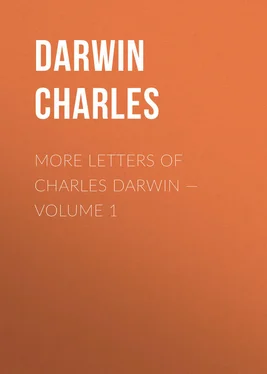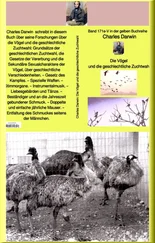Charles Darwin - More Letters of Charles Darwin — Volume 1
Здесь есть возможность читать онлайн «Charles Darwin - More Letters of Charles Darwin — Volume 1» — ознакомительный отрывок электронной книги совершенно бесплатно, а после прочтения отрывка купить полную версию. В некоторых случаях можно слушать аудио, скачать через торрент в формате fb2 и присутствует краткое содержание. Жанр: foreign_antique, foreign_prose, на английском языке. Описание произведения, (предисловие) а так же отзывы посетителей доступны на портале библиотеки ЛибКат.
- Название:More Letters of Charles Darwin — Volume 1
- Автор:
- Жанр:
- Год:неизвестен
- ISBN:нет данных
- Рейтинг книги:4 / 5. Голосов: 1
-
Избранное:Добавить в избранное
- Отзывы:
-
Ваша оценка:
- 80
- 1
- 2
- 3
- 4
- 5
More Letters of Charles Darwin — Volume 1: краткое содержание, описание и аннотация
Предлагаем к чтению аннотацию, описание, краткое содержание или предисловие (зависит от того, что написал сам автор книги «More Letters of Charles Darwin — Volume 1»). Если вы не нашли необходимую информацию о книге — напишите в комментариях, мы постараемся отыскать её.
More Letters of Charles Darwin — Volume 1 — читать онлайн ознакомительный отрывок
Ниже представлен текст книги, разбитый по страницам. Система сохранения места последней прочитанной страницы, позволяет с удобством читать онлайн бесплатно книгу «More Letters of Charles Darwin — Volume 1», без необходимости каждый раз заново искать на чём Вы остановились. Поставьте закладку, и сможете в любой момент перейти на страницу, на которой закончили чтение.
Интервал:
Закладка:
Down, April 23rd {1854}.
My dear Sir
I have got out all the specimens, which I have thought could by any possibility be of any use to you; but I have not looked at them, and know not what state they are in, but should be much pleased if they are of the smallest use to you. I enclose a catalogue of habitats: I thought my notes would have turned out of more use. I have copied out such few points as perhaps would not be apparent in preserved specimens. The bottle shall go to Mr. Gray on Thursday next by our weekly carrier.
I am very much obliged for your paper on the Mollusca (33/2. The paper of Huxley's is "On the Morphology of the Cephalous Mollusca, etc." ("Phil. Trans. R. Soc." Volume 143, Part I., 1853, page 29.)); I have read it all with much interest: but it would be ridiculous in me to make any remarks on a subject on which I am so utterly ignorant; but I can see its high importance. The discovery of the type or "idea" (33/3. Huxley defines his use of the word "archetype" at page 50: "All that I mean is the conception of a form embodying the most general propositions that can be affirmed respecting the Cephalous Mollusca, standing in the same relation to them as the diagram to a geometrical theorem, and like it, at once, imaginary and true.") (in your sense, for I detest the word as used by Owen, Agassiz & Co.) of each great class, I cannot doubt, is one of the very highest ends of Natural History; and certainly most interesting to the worker-out. Several of your remarks have interested me: I am, however, surprised at what you say versus "anamorphism" (33/4. The passage referred to is at page 63: "If, however, all Cephalous Mollusks...be only modifications by excess or defect of the parts of a definite archetype, then, I think, it follows as a necessary consequence, that no anamorphism takes place in this group. There is no progression from a lower to a higher type, but merely a more or less complete evolution of one type." Huxley seems to use the term anamorphism in a sense differing from that of some writers. Thus in Jourdan's "Dictionnaire des Termes Usites dans les Sciences Naturelles," 1834, it is defined as the production of an atypical form either by arrest or excess of development.), I should have thought that the archetype in imagination was always in some degree embryonic, and therefore capable {of} and generally undergoing further development.
Is it not an extraordinary fact, the great difference in position of the heart in different species of Cleodora? (33/5. A genus of Pteropods.) I am a believer that when any part, usually constant, differs considerably in different allied species that it will be found in some degree variable within the limits of the same species. Thus, I should expect that if great numbers of specimens of some of the species of Cleodora had been examined with this object in view, the position of the heart in some of the species would have been found variable. Can you aid me with any analogous facts?
I am very much pleased to hear that you have not given up the idea of noticing my cirripedial volume. All that I have seen since confirms everything of any importance stated in that volume — more especially I have been able rigorously to confirm in an anomalous species, by the clearest evidence, that the actual cellular contents of the ovarian tubes, by the gland-like action of a modified portion of the continuous tube, passes into the cementing stuff: in fact cirripedes make glue out of their own unformed eggs! (33/6. On Darwin's mistake in this point see "Life and Letters," III., page 2.)
Pray believe me, Yours sincerely, C. DARWIN.
I told the above case to Milne Edwards, and I saw he did not place the smallest belief in it.
LETTER 34. TO T.H. HUXLEY. Down, September 2nd, {1854}.
My second volume on the everlasting barnacles is at last published (34/1. "A Monograph of the Sub-class Cirripedia. II. The Balanidae, the Verrucidae." Ray Society, 1854.), and I will do myself the pleasure of sending you a copy to Jermyn Street next Thursday, as I have to send another book then to Mr. Baily.
And now I want to ask you a favour — namely, to answer me two questions. As you are so perfectly familiar with the doings, etc., of all Continental naturalists, I want you to tell me a few names of those whom you think would care for my volume. I do not mean in the light of puffing my book, but I want not to send copies to those who from other studies, age, etc., would view it as waste paper. From assistance rendered me, I consider myself bound to send copies to: (1) Bosquet of Maestricht, (2) Milne Edwards, (3) Dana, (4) Agassiz, (5) Muller, (6) W. Dunker of Hesse Cassel. Now I have five or six other copies to distribute, and will you be so very kind as to help me? I had thought of Von Siebold, Loven, d'Orbigny, Kolliker, Sars, Kroyer, etc., but I know hardly anything about any of them.
My second question, it is merely a chance whether you can answer, — it is whether I can send these books or any of them (in some cases accompanied by specimens), through the Royal Society: I have some vague idea of having heard that the Royal Society did sometimes thus assist members.
I have just been reading your review of the "Vestiges" (34/2. In his chapter on the "Reception of the Origin of Species" ("Life and Letters," II., pages 188-9), Mr. Huxley wrote: "and the only review I ever have qualms of conscience about, on the ground of needless savagery, is one I wrote on the 'Vestiges.'" The article is in the "British and Foreign Medico-chirurgical Review," XIII., 1854, page 425. The "great man" referred to below is Owen: see Huxley's review, page 439, and Huxley's "Life." I., page 94.), and the way you handle a great Professor is really exquisite and inimitable. I have been extremely interested in other parts, and to my mind it is incomparably the best review I have read on the "Vestiges"; but I cannot think but that you are rather hard on the poor author. I must think that such a book, if it does no other good, spreads the taste for Natural Science.
But I am perhaps no fair judge, for I am almost as unorthodox about species as the "Vestiges" itself, though I hope not quite so unphilosophical. How capitally you analyse his notion about law. I do not know when I have read a review which interested me so much. By Heavens, how the blood must have gushed into the capillaries when a certain great man (whom with all his faults I cannot help liking) read it!
I am rather sorry you do not think more of Agassiz's embryological stages (34/3. See "Origin," Edition VI., page 310: also Letter 40, Note.), for though I saw how exceedingly weak the evidence was, I was led to hope in its truth.
LETTER 35. TO J.D. HOOKER. Down {1854}.
With respect to "highness" and "lowness," my ideas are only eclectic and not very clear. It appears to me that an unavoidable wish to compare all animals with men, as supreme, causes some confusion; and I think that nothing besides some such vague comparison is intended, or perhaps is even possible, when the question is whether two kingdoms such as the Articulata or Mollusca are the highest. Within the same kingdom I am inclined to think that "highest" usually means that form which has undergone most "morphological differentiation" from the common embryo or archetype of the class; but then every now and then one is bothered (as Milne Edwards has remarked) by "retrograde development," i.e., the mature animal having fewer and less important organs than its own embryo. The specialisation of parts to different functions, or "the division of physiological labour" (35/1. A slip of the pen for "physiological division of labour.") of Milne Edwards exactly agrees (and to my mind is the best definition, when it can be applied) with what you state is your idea in regard to plants. I do not think zoologists agree in any definite ideas on this subject; and my ideas are not clearer than those of my brethren.
Читать дальшеИнтервал:
Закладка:
Похожие книги на «More Letters of Charles Darwin — Volume 1»
Представляем Вашему вниманию похожие книги на «More Letters of Charles Darwin — Volume 1» списком для выбора. Мы отобрали схожую по названию и смыслу литературу в надежде предоставить читателям больше вариантов отыскать новые, интересные, ещё непрочитанные произведения.
Обсуждение, отзывы о книге «More Letters of Charles Darwin — Volume 1» и просто собственные мнения читателей. Оставьте ваши комментарии, напишите, что Вы думаете о произведении, его смысле или главных героях. Укажите что конкретно понравилось, а что нет, и почему Вы так считаете.












